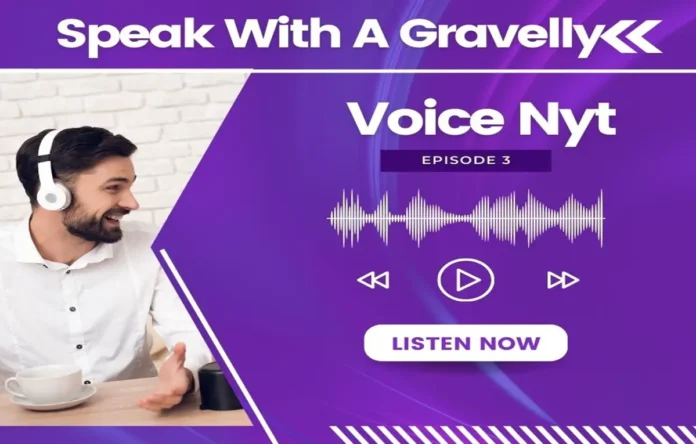Gravelly voices, characterized by a rough, raspy quality, often hold a unique appeal in various forms of media and communication. In popular culture, such a voice is frequently associated with authority, ruggedness, and a sense of wisdom that comes with experience.
It’s this distinctive tone that captures the audience’s attention, making characters and individuals instantly memorable. In the context of the New York Times (NYT) crossword puzzles, the mention of a “gravelly voice” can evoke curiosity and challenge, adding a layer of linguistic intrigue to the solver’s experience.
Historical Context and Popularity in NYT Crosswords
The NYT crossword has long been a bastion of culture, wit, and linguistic play. Clues involving “speak with a gravelly voice Nyt” tap into a deeper vein of language—merging phonetics with cultural references. Historically, these puzzles have used such descriptions to not only challenge solvers but also to connect them with broader cultural dialogues, referencing iconic figures known for their gravelly voices. This blending of language arts with popular culture ensures that each crossword clue is more than a mere brain teaser; it’s a gateway to a richer understanding of language and society.
Semantic Analysis of ‘Gravelly Voice’ in Crosswords
In analyzing the semantics behind the phrase “speak with a gravelly voice,” it’s evident that NYT crosswords often leverage such clues for their dual appeal—linguistic and cultural. This approach tests solvers’ vocabulary and deduction skills as well as their cultural literacy.
Semantic SEO techniques highlight the connection between related terms and variations like “speak with a gravelly voice nyt crossword clue” or “speaks with a gravelly voice nyt,” ensuring that content is rich in relevant keywords that enhance search engine visibility and user engagement.
Iconic Characters and Celebrities with Gravelly Voices
Starting with Tom Wait’s growling singing voice to Clint Eastwood’s commando-like whisper, gritty-voiced people have always had a profound place in various forms of media. Such voices express personality and truth, which may even become a character’s signature. In crosswords, the clues that lead to these voices encourage the solvers to use their information on both the fields of entertainment and their respective histories, making it a rather deep and, more importantly, personal experience.

The Role of Voice Quality in Puzzles and Linguistic Challenges
Voice quality in crossword puzzles does more than fill squares; it serves as a linguistic puzzle in itself. Descriptors like “gravelly” challenge solvers to think beyond straightforward definitions, considering how sound and texture convey meaning. This exploration into the auditory aspects of language enhances the solver’s engagement and appreciation for the puzzle, turning a simple clue into a discussion point about linguistic diversity and auditory perception.
The NYT Mini Crossword: A Quick Mental Workout
The NYT Mini Crossword is a crossword puzzle that can be solved in a few minutes and provides fun for the readers. Due to the designated nature of the puzzles, it can be easily considered a concise mental exercise suitable for people who do not have much time left or those who want to strain their brains just for a few minutes.
The fact that the gamer has found a good vocabulary exercise and joke in the mini crossword underscores the many-layered interest of simple puzzles and the exponentially wide appeal to audiences of all kinds of solvers because of their gravelly association.
Crossword Strategies: Decoding Clues Related to Voices
Finding strategies to deal with crossword clues about voices involves a combination of phonetics and references to cultures. In solvers’ discussions, the Solvers are invited to consider how voices can be characterized (raspy, smooth, shrill) and connect these characteristics with the reverse pop culture media figures. This approach not only helps in solving the puzzle but also assists in improving the level of interest of the solver in the puzzle, at the same time proving to be informative and enjoyable.

The Linguistic Play of Crosswords: Words, Phonetics, and Clues
Crosswords are a playground for linguistic play, where words and phonetics intertwine to create challenging and engaging puzzles. The inclusion of auditory descriptors like “gravelly” in clues showcases the puzzle creators’ skill in leveraging language’s sound aspects, enhancing the puzzle’s educational value and enjoyment. This linguistic play is a core reason why crosswords remain popular, as they continuously provide solvers with new ways to think about and engage with language.
Future Trends in Crossword Themes: What’s Next?
In the future, crossword puzzles are expected to develop and expand the number of different topics and names associated with them, subscribing to the shift in people’s concerns and the world around them. There might be a shift to have technology, new generation slang, or global cultural themes in future puzzles, thus improving the level of difficulty and expanding the base of users to cover a cross-section of society.
Resources and Tools for Aspiring Crossword Enthusiasts
For those who would like to know more about crosswords, many options and help are provided below. In addition to crossword puzzles that can be found in newspapers or smartphones, where there are hundreds of levels daily, the audience and available materials are as varied as the solutions. Interacting with such a resource can not only help develop the people’s skills but also increase their admiration of this complex sort of art.
Conclusion
Speaking of language and culture, it is about puzzles, as in the case of clues like ‘speak with a gravelly voice.’ These puzzles are not merely intellectual exercises; they introduce the solver to a new way of engaging with language.
Thus, both the serious crossword solver and the occasional participant in such puzzles embark on a discourse with the creator of the crossword and implicit to this discourse, particularly within each of the clues presented in crosswords, which are essentially words transcending national, continental, and linguistic divides, is the forging of greater understanding of language and culture.
For More Articles Click the: Ezinee.co.uk
FAQ’s
What does it mean when a crossword clue describes a voice as ‘gravelly’?
In crosswords, describing a voice as “gravelly” typically hints at a rough, raspy quality, often used to suggest depth, emotion, or a distinctive sound that solvers need to match with a familiar voice or character.
How can understanding voice descriptions enhance crossword solving?
Knowing how different voices are described can help solvers deduce answers from auditory clues, adding an extra layer of challenge and engagement to the puzzle-solving process.
Are there specific strategies for solving voice-related crossword clues?
Yes, familiarizing oneself with common descriptions and their associated characters or celebrities can provide crucial hints, and thinking about how voices sound can also aid in solving these clues.
Where can I find resources to improve my crossword-solving skills?
Resources range from crossword apps and websites to books and community forums. Engaging with these can provide practice puzzles, strategies, and a community of fellow enthusiasts to learn from.



